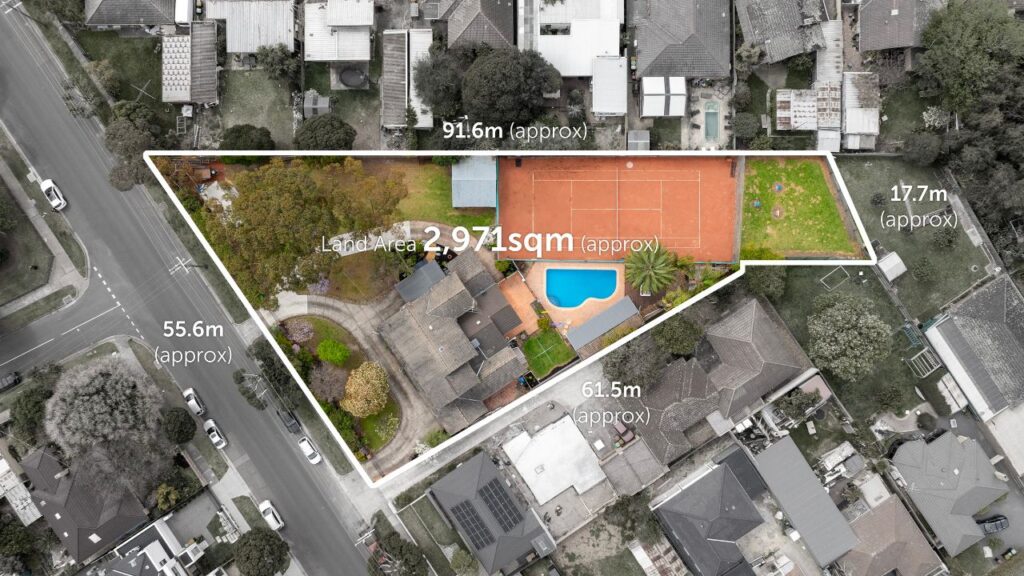Selling a unique or unconventional home takes more than the standard advertising formula. When a property doesn’t fit neatly into its postcode – perhaps it’s larger, more luxurious, or simply unlike anything else nearby – traditional marketing channels may not reach the right audience.
That’s where strategy, creativity, and a willingness to experiment make all the difference.
For Buxton Real Estate’s Mathew Cox, that challenge came to life with the listing of 4 Southern Road, Mentone, Victoria; a sprawling family estate complete with a pool, cabana, tennis court, and its own children’s playground. It was the most unusual property he’d seen in his three decades in real estate.
Finding the right audience
“It’s the first time in over thirty years this landholding has come to market,” Mathew said.
“There’s nothing else quite like it in the area. It’s 3,000 square metres of lifestyle living; something you’d typically find in Mount Eliza or further down the coast.”
He quickly realised that the buyer for this home might not be actively searching in Mentone at all.
“We had to think outside the box because the buyer for this might be looking elsewhere,” he said. “This sort of block just doesn’t exist locally.”
That meant shifting focus from the usual five-kilometre radius around the suburb to buyers in postcodes where large landholdings are common, such as Keysborough and the Mornington Peninsula.
“The idea was to wake up buyers in those areas to the fact there’s a coastal property that delivers the same sense of space,” he said.

Using AI and data to pinpoint buyers
Mathew and his team used an AI-based advertising tool that identifies “high-intent” buyers who might be preparing to buy or sell, even if they aren’t actively browsing real estate listings.
“It’s similar to how your phone suddenly shows you ads for white runners after you’ve searched for shoes,” he said.
“This technology tracks online behaviour, like visiting renovation websites, and helps us target people who might be in that property mindset.”
This allowed Buxton to push the listing in front of potential buyers who weren’t necessarily searching for Mentone but could be enticed by its lifestyle appeal.
Expanding to culturally diverse channels
Given Mentone’s strong school zones and diverse demographic, Mathew also promoted the property through Chinese property websites as they were platforms that had proven increasingly effective compared to traditional print.
“We’ve used Chinese newspapers in the past, but the websites are where the buyers are now,” he said.
“We also communicate with them through WeChat and translation tools like iTranslate. It’s about making sure that if someone’s interested, language isn’t a barrier.”
Adjusting the campaign strategy
Unusual homes often need longer campaigns and a different sales approach.
“The standard four-week campaign doesn’t work for these kinds of properties,” Mathew said.
“We’ve stretched this one to seven weeks to give it the time it deserves.”
Also, rather than a traditional auction, the team opted for an expressions of interest campaign.
“Auctions rely on competition to determine value,” he explained. “Expressions of interest can reveal a buyer willing to pay more because the property suits their lifestyle or needs perfectly.”
Making the case for bigger marketing budgets
Mathew said vendors are becoming more open to investing in broader marketing strategies – especially for higher-end homes.
“It’s easier now because advertising has become more mainstream,” he said. “If you’ve got a $1 million property, spending $10,000 to get it in front of the right people makes sense.”
That’s particularly true for prestige listings, where the goal isn’t volume – it’s precision.
“We’re not chasing dozens of buyers,” he said. “We’re looking for the one buyer who sees the value and is prepared to pay for it.”
Overall, he says this listing experience has changed how he approaches premium campaigns.
“It’s definitely opened up how we handle high-end listings,” he said.
“Thinking beyond the immediate area, using AI tools, and reaching multicultural audiences … these aren’t just extras anymore. They’re essential.”

